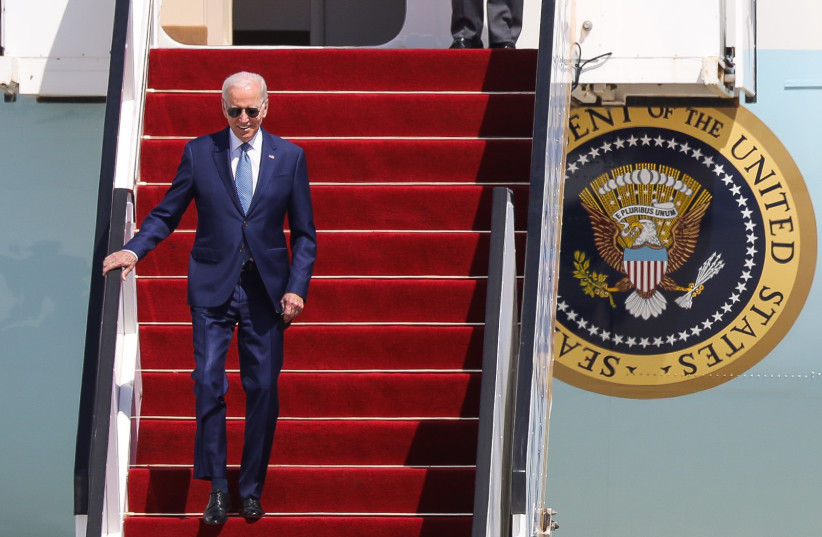President Joe Biden is justifiably proud of his long history of support for Israel, dating back to his 1973 meeting as a first-term senator with then-prime minister Golda Meir. His current visit to Israel should be an occasion to renew and reaffirm both his personal relationship and the ironclad US-Israel alliance. However, poor staff work by the US threatens to create a controversy that once again turns a Biden visit into a bad news story for a US administration.
We have seen this movie before. In March 2010, during a visit by then-vice president Biden, the Jerusalem municipality announced a housing construction tender in a Jerusalem neighborhood called Ramat Shlomo.
With US media experts interpreting this as a calculated slight of the US vice president, Biden abruptly changed the tone of his visit and gave a press statement at the start of a state dinner in Jerusalem to “condemn this decision by the Israeli government to advance planning for housing units.” The media made his anger with Israel the theme of all subsequent reportage of his visit.
If the goal of the Biden statement in 2010 were to put down a marker on settlement construction – and perhaps to influence Israeli public opinion – then the choice of Ramat Shlomo as its focus was ill considered.
Israelis were surprised. Ramat Shlomo is not in east Jerusalem geographically – it is in the northwest of Jerusalem, on a hill overlooking both of the highways connecting west Jerusalem to the rest of Israel. To its east is the Israeli neighborhood of French Hill, residence of Hebrew University professors and Peace Now founders.

Down the slope from Ramat Shlomo is Israel’s 9/11 memorial, where all 2,974 names of those killed that day are inscribed. Members of Congress had attended its opening the prior year. The 1949-1967 ceasefire line (which Ramat Shlomo straddles) wound around the hills of Jerusalem, creating security threats that are a bitter memory for Israelis.
Today, Israelis daily commute past this new neighborhood, long since built and flourishing, heading to Tel Aviv. They have nicknamed it Givat Biden (Biden Heights).
Biden's current visit to Israel
TWELVE YEARS later, Biden returns. In the meantime, he and his administration have affirmed the policy of maintaining the US Embassy in Jerusalem as a tangible US recognition of Israel’s sovereignty over the city, including the eastern parts annexed by Israel shortly after the 1967 war. At the same time, the Biden administration seeks to improve relations with the Palestinians and to signal this improvement during his trip.
They decide to visit an important Palestinian medical institution in Jerusalem to show this support. It is the Augusta Victoria Hospital, located in eastern Jerusalem on a historic ridge overlooking the Old City with Hebrew University and Mt. Scopus to its north and the Mt. of Olives to its south.
The problem is that the Biden advance team denied the Israeli government’s request to accompany Biden on the Augusta Victoria Hospital visit. The Israelis support the visit and would like to be seen as supportive of this Palestinian institution. The hospital has had occasional tense relations with both Israel and the Palestinian Authority.
The Biden staff's refusal to allow Israeli officials to accompany Biden to Augusta Victoria is ill-considered for a few reasons. First, allowing an Israeli presence on the visit is consistent with the policy of recognizing Israel’s sovereignty over Jerusalem.
Conversely, denying such a presence looks like a small step toward the former US policy, when the US saw Jerusalem not as part of Israel but as a corpus separatum (Latin for “separated body”), whose status would be decided in future negotiations.
That policy was rejected first by Congress and later by administrations of both parties. It didn’t facilitate negotiations with the Palestinians and a return to it in any form would be a surprise to all.
Second, history matters in Jerusalem. Augusta Victoria Hospital is not only an important Palestinian institution located in the city of Jerusalem. It is no stranger to political symbolism. Founded in 1898 by Kaiser Wilhelm as a hostel for German pilgrims and named after his wife, it was initially the tangible German response to the czar’s construction of a Russian Compound on the other side of the city.
It remained Germany’s flagship site in the Holy Land, serving as a German military hospital during World War I, a German Lutheran church and later as a Nazi Party meeting site in the 1930s. During that period, the hostel barred Jewish visitors.
This information and much more is available on Augusta Victoria’s Wikipedia site. Once again barring Jews from entering Augusta Victoria seems tin-eared public policy, not designed to influence either the Israelis or the Palestinians along the way to coexistence and eventual peace.
Behind the scenes, the US can and should use the Biden visit to improve relations between Augusta Victoria and the Israeli government. But public rebukes won’t work.
Biden Heights was a semi-comical horror show that embarrassed the US and didn’t improve life for either Israelis or Palestinians. It doesn’t deserve a sequel.
The writer is a former US senior Foreign Service officer and president of the American Foreign Service Association. He is a lecturer at Shalem College in Jerusalem and president of the Inter Jewish Muslim Alliance.
